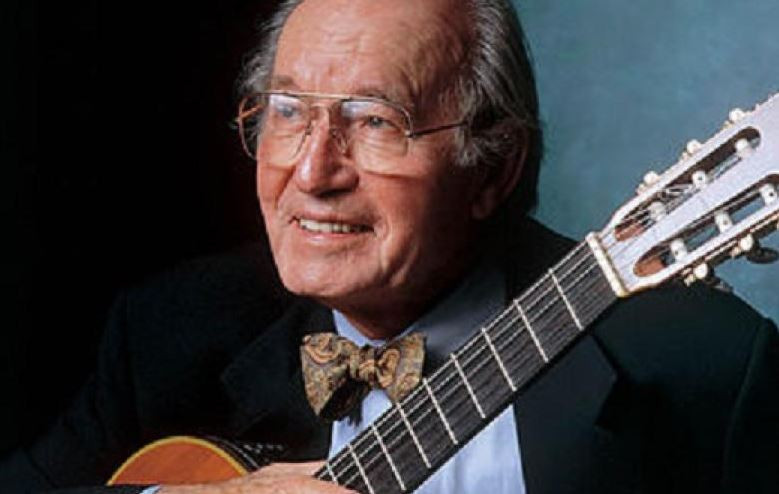
Guitarist Charlie Byrd was an American guitar virtuoso who made many recordings of enduring impact in jazz, blues and classical genres. He captured the lively expressiveness and rhythmic forms of jazz and blues with superb assurance and taste. Byrd liked playing unamplified guitar with the straight-on, 1930s swing, with considerable classical touch, too, and injected that classicism in an unpretentious way. And the blues he played were country-inspired with a personal, deeply felt expressionism.
Byrd, who was born in Suffolk, Virginia, in 1925, made a series of terrific recordings including Jazz Recital (1957), Jazz Samba (a 1962 collaboration with saxophonist Stan Getz), Blue Byrd (1979), Hollywood Byrd (1967), Tambu (1973), Brazilian Soul (1981), Isn’t It Romantic? (1984), My Inspiration (1999) and For Louis (2000).
Blues Sonata, released in 1961, showcased his ability to apply three different formats:jazz, blues and classical, though the latter elements were applied lightly. Backed by drummer Buddy Deppenshmidt, pianist Barry Harris, and bassist Keter Betts, Byrd picked his notes with a nice blues feel.
The opener, Polonaise Pour Pietre, a three-part piece Byrd original, opens in classical sonata form, followed in the second part in the dominant key, then the improvisation follows in yet another key. Later the trio (without piano) returns to the originating key for a restatement of both themes before ending. But, as with any best jazz, the interchanges flow smoothly and the listener may not be conscious of the tune’s arrangement intricacies, only the pleasure it generates.
The second track, Bellade in B Minor, is essentially a ballad influenced by classical composer Chopin in its melodic pattern but which has a mournfully pensive hint. Nevertheless, the power of Byrd’s unique romanticism is evident, and being one of his striking qualities, it creates an enormous appeal to lovers of guitar music, whether or not they are enthusiasts of jazz. Here, Byrd’s improvisation, with a classical touch, flows elegantly with nice brush work by Deppenshmidt and soulful bass notes by Betts.
And the classical-inspired Scherzo for an Old Shoe found the guitarist picking his notes with a pronounced Spanish flavour, an influence he always cherished. Unlike the two previous pieces, spacious interplay emerged between Byrd and his accompanists. The refrain comes out as a brief reaffirmation of the first movement of Polonaise Pour Pietre.
Then Charlie Byrd made what many guitar fans had not anticipated. He abruptly switched to electric guitar on the swinging pieces Alexander Ragtime Band (by Irving Berlin), Jordu (Duke Jordan), and Zing! Went the Strings of My Head (James F. Hanley). Byrd picked with interwoven crystal clear lines, taking on Harris’ chord comping, bopping piano phrasings, and engaging in straight swinging and ballad offerings with spontaneous reflexes.
Yet, again, the mood shifted on the Doris Fisher-Allan Roberts composition That Old Devil Called Love, a relaxed ballad masterpiece. Byrd played more chordal, and applied less of his classically-inspired figures. Still, he didn’t seem to follow any charts. Instead, he was just playing for fun, in the tradition of a backroom session.
Highly gifted, with over 50 albums as leader, Charlie Byrd, who passed away on December 2, 1999 aged 74, created a personal, deeply felt expression out of diverse influences that made their impact on him. Assimilating them, he played as he wished without regard for trend.
Studying under classical master Segovia, much of Byrd's improvisation revolved around the classical flamenco. In fact, his status as a jazzman had often been questioned, though there were no doubts about his mastery of the guitar.
Byrd achieved immense popularity on the Brazilian bossa nova wave in the early 60s. Collaborating with tenor saxophonist Getz on one of the first bossa nova albums, Jazz Samba, Byrd began a long preoccupation with that form. The hit song Desafinado is featured on his Latin Byrd album versions of One Note Samba and other Antonio Jobim compositions.